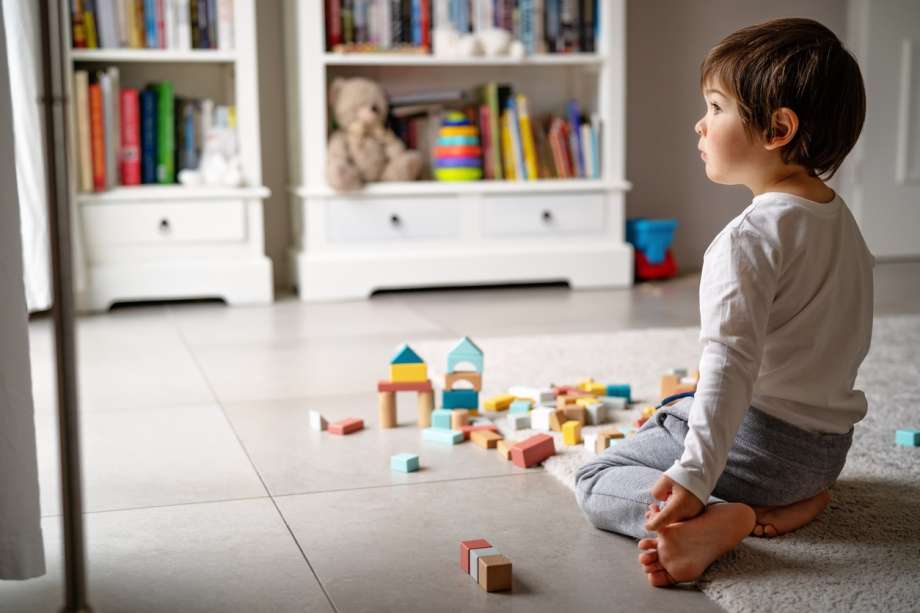Why Does My Child Talk to Themselves?

As a parent, seeing your child talking to themselves might be concerning.
You may wonder if this is a sign of loneliness, a mental health issue, or if there is something wrong.
You may also wonder if it’s normal for your child to talk to themselves so much, or if you should seek professional help.
Private speech, also known as self-talk, refers to a person's verbal or nonverbal communication with themselves. This can take the form of internal thoughts, muttered words, or even full-fledged conversations with an imaginary friend.
Related: My Child Talks Too Much!
In this article, we will explore why children talk to themselves, the benefits children talk to themselves, and when talking to oneself may become an issue.
Is it Normal for a Child to Talk to Themselves?
If you’re reading this, it’s probably because your child has been talking to themselves and you’re questioning whether this kind of self-talk is normal or a cause for concern.
Rest assured that, typically, a child talking to themselves isn’t something to worry about! It’s very common for children to talk to themselves as they grow and develop, especially in early childhood.
Children will start talking to themselves as early as age two, which is seen as a normal part of their linguistic and psychological development. Talking to themselves allows children to practice their language skills, work out their thoughts and feelings, improve their imagination and creativity, and practice problem-solving.
Talking to themselves can also help young children develop better self-control of their emotions and behavior. For example, a child may talk to themselves before trying a new task or when they are feeling overwhelmed. Self-talk can help them calm down and approach the task with confidence.
In short, talking to oneself is a healthy and normal aspect of a child's development, and is often seen as a sign of their growing communication skills and self-awareness.
Parents should not be concerned if they catch their children talking to themselves, as it is a common and positive behavior.
Why Do Children Talk to Themselves?
Children talk to themselves for many reasons. In fact, many children talk to themselves for some of the same reasons that adults do.
Some of the most common reasons include:
-
Practicing language skills
Children use talking to themselves as a way to practice and improve their language development. They try out new words and phrases and work on pronunciation and fluency.
-
Self-expression
Talking to themselves allows children to express their thoughts, feelings, and emotions in a safe and controlled environment. This can help children understand and better regulate their emotions.
3. Working out thoughts and feelings

Children may talk to themselves to help them process their thoughts and feelings. They may try to make sense of their experiences, or work through difficult situations. This can improve their self-regulation skills.
-
Imagination and creativity
Talking to oneself can also help children improve their imagination and creativity. Children with active imaginations may create scenarios and stories, and play out different scenarios in their minds or interact with imaginary friends.
-
Motivation
Just like adults, children can use positive self-talk to motivate themselves or boost their self-esteem. They may talk themselves through stressful situations or use affirmations to encourage themselves to persevere.
-
Memory aids
Some kids might also talk to themselves to help them remember important information, much like many adults do. Repeating important information or tasks can help them remember later on.
Is My Child Too Old to Talk to Themselves?

There is no set age at which children should stop talking to themselves or having imaginary friends. For some children, this behavior may continue into their adolescent years and beyond. As long as talking to themselves is not interfering with their daily life or social interactions, there is no reason to be concerned.
In fact, having an imaginary friend can be a positive aspect of child development. It can help them work through their thoughts and feelings, improve their imagination and creativity, and provide a source of comfort during times of stress or change.
It is important for parents to be supportive and understanding of their child's behavior, even if it may seem strange or unusual. Children should feel free to explore their imagination and develop their language skills through private speech.
Consider also that many adults talk to themselves! While this behavior might be more common among children, don’t be concerned if it continues beyond childhood.
Ask an Expert: Do Kids Outgrow Talking to Themselves?
We consulted elementary school counselor Barbara Potts to answer one parent’s concerns that her nine-year-old son’s habit of talking to himself would make it harder for him to make friends later in life.
Q: My son talks to himself. He doesn't have conversations or anything like that – he tells himself stories. He will watch a TV program or read a book, the story will stay with him, and he will actually "edit" or change the story around to suit his liking.
I don't really have a problem with this at home, but it's becoming an issue at school. It is annoying to the children sitting around him and to his teacher. I have talked to him about it and he says that he can't help himself.
I was worried about him missing important information in school, but that doesn't seem to be an issue as he continues to get straight As. He has been doing this all of his life.
His pediatrician said he would outgrow it, but it's starting to affect him socially, and children really don't want to play with him. He has a reputation for being "weird." The only person he plays with is his six-year-old sister. I would really like him to play with kids his own age, but I don't want to force him to get involved with groups that don't interest him.
Is there anything I should do, or was my doctor right that he'll outgrow this? If so, when?
A: You have quite a creative little guy. I'm sure you don't want to squelch this creativity – just help your son to channel it.
The other children are starting to notice your son's behavior, and that awareness will only increase as they get older. Sometimes this negative attention from peers can help a child become more aware of what he is doing and cause him to stop.
It's nice that a nine-year-old boy plays with his younger sister, but he does need to develop friends his own age and his peers may not want to be friends if they think he is "weird." You also don't want to see him continue to have his feelings hurt.
Ask the teacher to help him be aware when he is talking. They could develop a secret "signal," such as the teacher clearing his or her throat or tapping your son on the shoulder. This would allow your son to be aware of what he is doing, without calling his behavior to the attention of the other children.
Your pediatrician may be right in saying that your son will outgrow this behavior, but so far that hasn't happened and he needs some help with this. Try to help your son find some outlets for his creativity where his imagination can mean success.
Many communities have drama groups for children, or perhaps he could help with a preschool story-telling session at the public library. Joining a sports team, Boy Scouts, or a church group can give him other things to do and think about with children his own age and help him to make more friends.
When Should You Worry if an Older Child is Talking to Themselves?
While talking to themselves is a normal and healthy aspect of development for most children, in some cases, it can become disruptive. If self-talk is affecting a child's daily life or social interactions, they’re giving non-stop monologues, or they’re engaging in repeated negative self-talk, it may be time to seek professional advice.

For example, if a child is having difficulty interacting with others or if their self-talk is becoming intrusive and disruptive in social situations, it may be a sign of a more serious issue, such as anxiety, depression, or a developmental disorder like autism.
In some cases, children with Attention-Deficit Hyperactivity Disorder (ADHD) may appear to be talking to themselves when they are actually externalizing their internal thoughts and may be unaware of their external behavior. Children with autism may also engage in repetitive behaviors, including talking to themselves, as part of their repetitive and restricted behaviors.
It is important to note that talking to oneself is not diagnostic of ADHD, autism, or any other health condition and that these conditions are complex and have a range of symptoms and behaviors. If you are concerned about your child's behavior, seek the advice of a child psychologist or pediatrician.
To sum up, talking to oneself is a normal and healthy part of human development and can serve several important functions, including regulation of emotions and behavior, problem-solving, memory aids, and imaginative play.
For most children, talking to themselves is a normal and healthy aspect of their development and should not be a cause for concern unless it becomes disruptive to their daily life or social interactions.

